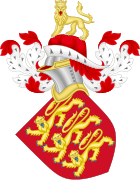Statute of Marlborough

|
|
| Citation | 52 Hen 3 c. 23 |
|---|---|
| Territorial extent | Kingdom of England (incl. Wales) |
| Other legislation | |
| Amended by | Statute Law Revision and Civil Procedure Act 1881 |
|
Status: Current legislation
|
|
| Revised text of statute as amended | |
The Statute of Marlborough (52 Hen 3) was a set of laws passed by King Henry III of England in 1267. It is the oldest piece of statute law in the United Kingdom that has not yet been repealed. There were twenty-nine chapters, of which four are still in force.
The Statute is so named as it was passed at Marlborough, where a Parliament was being held. The preamble dates it as "...the two and fiftieth year of the reign of King Henry, son of King John, in the utas of Saint Martin...", which would give a date of November 19, 1267; "utas" is an archaic term to denote the eighth day after an event, in this case the feast day of Saint Martin. The full title was Provisions made at Marlborough in the presence of our lord King Henry, and Richard King of the Romans, and the Lord Edward eldest son of the said King Henry, and the Lord Ottobon, at that time legate in England.
The Law Commission has suggested that two of the remaining four chapters be repealed, as they are no longer useful since the Tribunals, Courts and Enforcement Act. In June 2015 the Law Commission and Scottish Law Commission published a draft bill incorporating the repeal of c.4 (regulating the "taking of unreasonable distresses and the removal of distrained goods out of the debtor’s county") and c.15 (concerning the "levying of distress off the tenanted property or on a public highway") of the Statute.
The chapters currently valid are c.1, c.4, and c.15 (often referred to as the Distress Act 1267), which seek to govern the recovery of damages ("distresses") and make it illegal to obtain recompense for damages other than through the courts, and c.23 (the Waste Act 1267), which seeks to prevent tenant farmers from "making waste" to land they are in tenancy of. Chapter 15 sets out places in which "distresses" are forbidden to be taken; these include the King's Highway and the Common Street. In other words, actions to remedy a breach of some kind by one person against another may not be taken in the street etc.
...
Wikipedia
